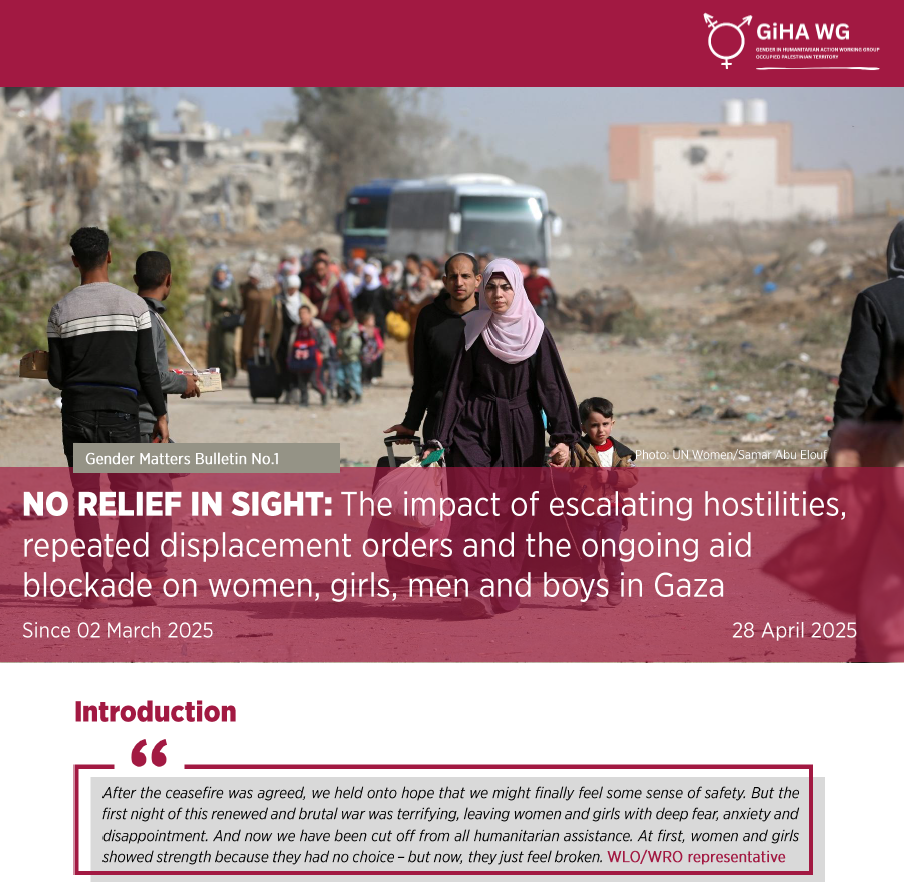
Gender Matters Bulletin - No Relief in Sight: The impact of escalating hostilities, repeated displacement orders and the ongoing aid blockade on women, girls, men and boys in Gaza

Introduction
The collapse of the fragile ceasefire, escalating hostilities, repeated displacement orders, and ongoing aid blockade have created a humanitarian catastrophe in Gaza, with devastating consequences for the Palestinian population, particularly women and girls. The crisis is deepening existing gender inequalities and disproportionately affecting those with intersecting vulnerabilities – such as women heads of households, adolescent girls, older women, caregivers, and those with disabilities or chronic health conditions. For more than 55 days, since 2 March 2025, Israeli authorities have enforced a complete blockade on the entry of all humanitarian assistance and commercial supplies into Gaza, marking the longest border closure since 7 October 2023. Authorities have blocked the entry of lifesaving medicine, food, tents, hygiene items and other essential supplies; along with equipment needed to undertake critical water and sanitation maintenance and repairs, fuel needed to continue operations of medical equipment and ambulances, bakeries, community kitchens, and desalination plants, and rotations of international emergency medical teams. Many humanitarian stocks, including food and tents, have already been exhausted, while others are rapidly dwindling.
Since 18 March 2025, Israeli forces have ramped up airstrikes targeting shelters, hospitals and community kitchens, and severing electricity, water and telecommunications networks. Between 7 October 2023 and 22 April 2025, 51,266 people have been killed, and 116,991 people have been injured. Between 18 March and 17 April 2025, 1,691 people (308 women, 595 children, 105 elderly and 683 men) have been killed and 4,464 people (842 women, 1,610 children, 225 elderly and 1,787 men) have been injured. Since the escalation of hostilities on 18 March 2025, women and children account for at least 53 per cent of casualties and at least 55 per cent of injuries. Furthermore, at least 36 Israeli airstrikes have killed only women and children. Between 18 March and 22 April 2025, Israeli forces issued 20 displacement orders, placing 142.7 square kilometres – 39 per cent of Gaza – under forced displacement. In combination with Israeli-designated “no-go” zones, 69 per cent of Gaza is now inaccessible or unsafe. An estimated 420,936 people (around 207,521 women and girls, and 213,415 men and boys) have been forced to flee their homes again, often for the second or third time. The crisis has created around 12,934 new women-headed households and left 17,000 children (around 8,381 girls and 8,619 boys) unaccompanied or separated. The number of women, girls, men and boys with disabilities is unknown, however Gaza is now home to the highest number of child amputees in the world.
Methodology
This Gender Matters Bulletin was developed by the Gender in Humanitarian Action (GiHA) Working Group in the occupied Palestinian territory (oPt) to highlight the impact of escalating hostilities, repeated displacement orders, and the ongoing aid blockade in Gaza on women, girls, men and boys since 2 March 2025. The Bulletin presents a multisectoral gender analysis of the crisis, addressing the specific needs and experiences of women, girls, men and boys across key sectors including health, food security, nutrition, water, sanitation and hygiene, shelter, education and protection. It also examines the impact of the ongoing crisis on women’s organizations, including women-led and women’s rights organizations (WLOs and WROs), and female frontline workers. The analysis draws upon a desk review of relevant literature, including needs assessments and situation reports. It also incorporates the findings of focus group discussions held with 12 WLOs and WROs on 8–9 April 2025. Participating organizations included: AISHA Association for Woman and Child Protection, Al Zahra Association for Women and Child Development, Beesan Benevolent Association, Bozour Theatre Association for Arts and Culture, Centre for Women's Legal Research, Community Development and Media Centre, Counselling and Protection, Culture and Free Thought Association, Palestinian Centre for Human Rights, Palestinian Working Woman Society for Development, Save Youth Future Society, Stars of Hope and Women’s Affairs Centre.